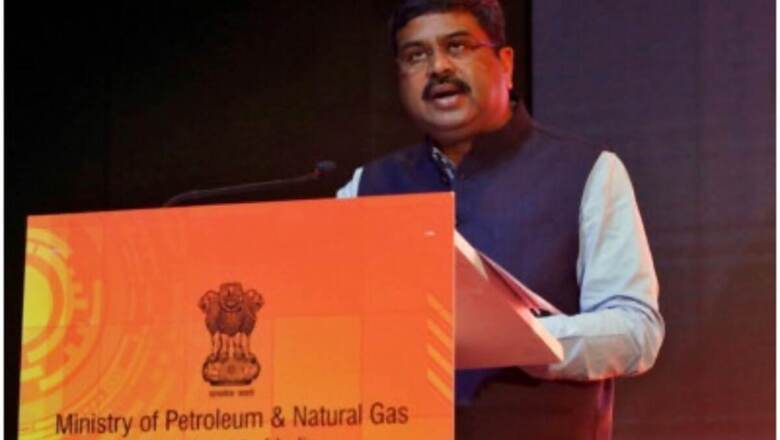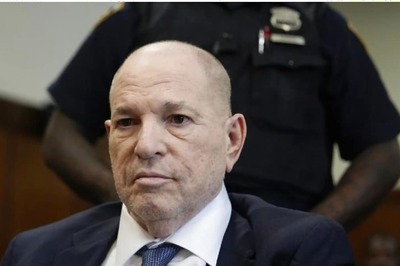
views
India will see an investment of Rs 10,000 crore in the next three years in setting up of LNG stations, a fuel that promises to revolutionalise long-haul transport with reduced cost and lesser emissions, Oil Minister Dharmendra Pradhan said on Thursday. Liquefied natural gas (LNG), which is supercooled natural gas, is favoured by long-haul buses and trucks due to its higher energy density than CNG, its ability to give a 600-800 km run on a single fill, and it being 30-40 per cent cheaper than diesel.
So far, India uses petrol, diesel, CNG and auto-LPG as fuels to run automobiles. LNG is a new fuel that can be dispensed from outlets similar to petrol pumps, and is used not just in long long-haul buses and trucks but also in running mining equipment, as bunker fuel, and rail locomotives. LNG will reduce the cost of operation as well as reduce carbon emissions, Pradhan said at the launch of construction of the first 50 LNG dispensing stations.
"In the next three years, Rs 10,000 crore will be spent on setting up of 1,000 LNG stations in the private and public sector," he said. LNG as a fuel, he said, is poised to bring a transformational change in the way transportation happens.
"There are around 10 million trucks in the country. If we are able to convert even 10 per cent of them (10 lakh), imagine the savings it will bring considering the fact that LNG is up to 40 per cent cheaper than diesel," he said. LNG as a fuel has almost zero carbon emissions and 85 per cent lesser NOx emissions, he said.
The initial 50 LNG stations are being set up on the Golden Quadrilateral highways connecting four metros of Delhi, Mumbai, Chennai and Kolkatta. "In times to come, there will be an LNG station at every 200-300 km on the GQ and on all major highways," he said.
Promoting LNG as a fuel is part of the government's push to raise the share of natural gas in its energy basket to 15 per cent by 2030 from the current 6.2 per cent. Greater use of environmentally friendly natural gas will bring carbon emissions down. "We have been working on a well thought of strategy for a gas-based economy.
"Expansion of city gas networks, laying of trunk pipelines, building LNG (import) terminals, raising of domestic production fo gas, simplification of tax structure and a uniform and simple tariff structure are all part of that plan," he said. The initial 50 LNG stations would be set up in one year, he said.
Pradhan said 20-25 million standard cubic meters per day-equivalent LNG will be consumed in the transportation sector. "LPG is going to be priced cheaper. If we buy LNG (from abroad), it will reduce our dependence on crude oil. Will lower demand from the world's third-largest importer, crude oil prices will soften, thus helping us," he said.
India is 85 per cent dependent on imports to meet its crude oil needs while it imports about half of its gas needs. With LNG being cheaper than diesel by 30-40 per cent, use of the new fuel in long-haul transportation, as well as sectors such as mining, would help cut logistics cost and have a positive impact on inflation, he said.
Of the initial 50 LNG stations being set up, state-owned Indian Oil Corp (IOC) will set up the maximum 20 outlets. Hindustan Petroleum Corp Ltd (HPCL) and Bharat Petroleum Corp Ltd (BPCL) would set up 11 each, while gas utility GAIL would put up six outlets and Petronet LNG Ltd the remaining two. Gujarat, which houses almost two-thirds of India's current LNG import capacity, would see the maximum number of LNG stations at 10. Maharashtra and Tamil Nadu, which too have LNG terminals, would each house 8 LNG stations, while Andhra Pradesh will get 6, Karnataka 5, Kerala 3, Odisha 1, Telangana 2, Haryana 1, Rajasthan 3, Uttar Pradesh 2 and Madhya Pradesh 1.
Pradhan said shifting trucks to LNG from liquid fuel will lead to savings and cut in emissions too. Oil Secretary Tarun Kapoor said LNG is a clean fuel, convenient and bit cheaper than other fuels. "It is very appropriate for long-distance transportation." The first trial of LNG as fuel started in 2015 by IOC and Tata Motors. Thereafter, first LNG-run bus was launched in 2016 and now, the fuel use is attaining commercial scale, he said.
Read all the Latest News, Breaking News and Coronavirus News here




















Comments
0 comment